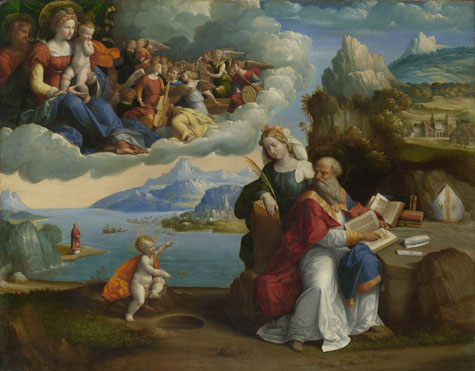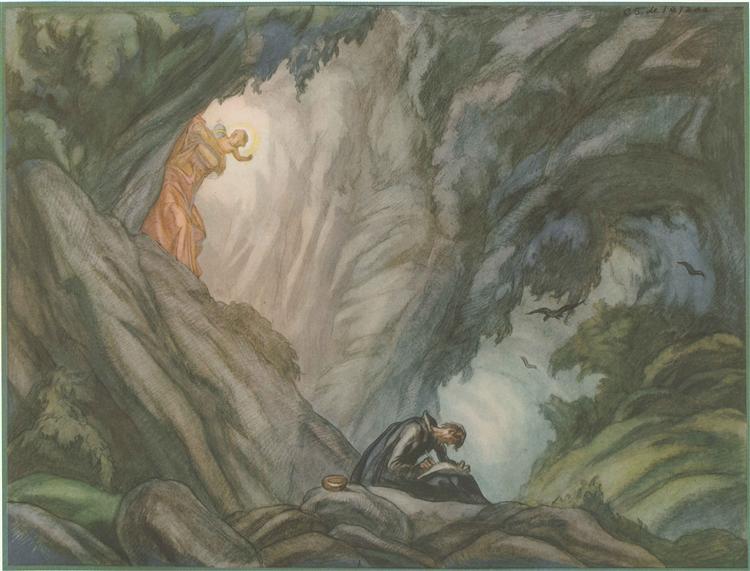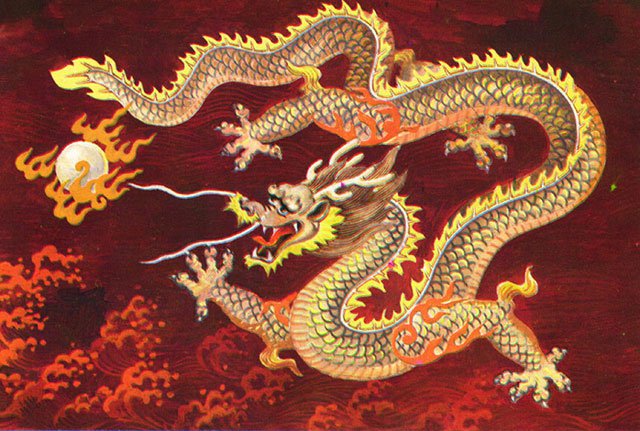If, however, the significance of the Christ for the world was to be His bringing to all men something common to all of them, then not only this individual working of the Son had to proceed from the Christ, but the element of Spirit, which can encompass something that belongs to all men, had to be renewed by Him. This is indicated by the statement that after the Christ had worked upon the Logos-nature of man, He sent forth the Spirit in the form of the renewed or `Holy Spirit'.
Thus was created that element common to all men which is characterised when we are told that the disciples, after they had received the Spirit, began to speak in the most diverse tongues. Here we are shown how the common element resides in the outpouring of the Holy Spirit. And something else is indicated: how different is this outpouring of the Spirit from the simple imparting of the power of the Son, for in the Acts of the Apostles we are told that certain persons to whom the apostles came had already received the Jesus-baptism, and yet they had now to receive for the first time the Spirit, symbolically indicated by the laying on of hands. In the characterisation of the Christ Event we are made very precisely aware of the difference between the working we have to designate as the Christ-working, which acts upon the subconscious impulses of the soul and so must have a personal, inward character, and the Spirit-element, which represents something common to all mankind.
It is this Spirit-element that those who have named themselves 'Rosicrucians' have sought to preserve most carefully, as far as human weakness permits. The Rosicrucians have always wished to adhere strictly to the rule that even in the highest regions of Initiation nothing must be worked upon except the Spirit-element which, as common between man and man, is available in the evolution of humanity.
The Initiation of the Rosicrucians was an Initiation of the Spirit. It was never an Initiation of the Will, for the Will of man was to be respected as a sanctuary in the innermost part of the soul. Hence the individual was led to those Initiations which were to take him beyond the stage of Imagination, Inspiration and Intuition, but always so that he could recognise within himself the response which the development of the Spirit-element was to call forth. No influence was to be exerted on the Will.
We must not mistake this attitude for one of indifference towards the Will. The point is that by excluding all direct working upon the Will, the purest spiritual influence was imparted indirectly through the Spirit. When we come to an understanding with another man with regard to entering on the path of knowledge of the Spirit, light and warmth are radiated from the spiritual path, and they then enkindle the Will, but always by the indirect path through the Spirit - never otherwise.
In Rosicrucianism, therefore, we can observe in the highest sense that impulse of Christianity which finds twofold expression: on the one hand in the Son-element, in the Christ-working which goes down deeply into the subconscious; on the other, in the Spirit-working which embraces all that falls within the horizon of our consciousness. We must indeed bear the Christ in our Will; but the way in which men should come to an understanding with each other in life concerning the Christ can be found only in the Rosicrucian sense- through a conscious soul-life which penetrates ever more deeply into the occult.
In reaction against many other spiritual streams in Europe, the opposite way was taken by those who are usually called Jesuits. The radical, fundamental difference between what we justifiably call the Christian way of the Spirit and the Jesuit way of the Spirit, which gives a one-sided exaggeration to the Jesus-Principle, is that the intention of the Jesuit way is to work directly, at all times, upon the Will. The difference is clearly shown in the method by which the pupil of Jesuitism is educated. Jesuitism is not to be taken lightly, or merely exoterically, but also esoterically, for it is rooted in esotericism. It is not, however, rooted in the spiritual life that is poured out through the symbol of Pentecost, but it seeks to root itself directly in the Jesus-element of the Son, which means in the Will; and thereby it exaggerates the Jesus-element of the Will.
This will be seen when we now enquire into the esoteric part of Jesuitism, its various spiritual exercises. How were these exercises arranged? The essential point is that every single pupil of Jesuitism goes through exercises which lead into the occult life, but into the Will, and within the field of occultism they hold the Will in severe discipline; they `break it in', one might say. And the significant fact is that this discipline of the Will does not arise merely from the surface of life, but from something deeper, because the pupil has been led into the occult, in the way just indicated.
If now, leaving aside the exercises of prayer preparatory to all Jesuit exercises, we consider these occult exercises, at least in their chief points, we find that the pupil has first to call up a vivid Imagination of Christ Jesus as the King of the Worlds- mark this carefully: an Imagination.
And no one would be received into the degrees of Jesuitism who had not gone through such exercises, and had not experienced in his soul the transformation which such psychic exercises mean for the whole man. But this Imaginative presentation of Christ Jesus as King of the Worlds has to be preceded by something else. The pupil has to call up for himself, in absolute solitude and seclusion, a picture of man as he was created in the world, and how by falling into sin he incurred the possibility of most terrible punishments. And it is strictly prescribed how one must picture such a man; how if he were left to himself he would incur the utmost of torturing penalties. The rules are extraordinarily severe. With all other concepts or ideas excluded, this picture must live uninterruptedly within the soul of the future Jesuit, the picture of the God-forsaken man, the man exposed to the most fearful punishments, together with the feeling: `That am I, since I have come into the world and have forsaken God, and have exposed myself to the possibility of the most fearful punishments.' This must call forth the fear of being forsaken by God, and detestation of man as he is according to his own nature.
Then, in a further Imagination, over against the picture of the outcast, God-forsaken man, must be set the picture of the God full of pity who then became Christ, and through His acts on earth atones for what man has brought about by forsaking the divine path. In contrast to the Imagination of the God-forsaken man, there must arise that of the all merciful, loving Being, Christ Jesus, to whom alone it is due that man is not exposed to all possible punishments working upon his soul. And, just as vividly as a feeling of contempt for the forsaking of the divine path had first to become fixed in the soul of the Jesuit pupil, so must a feeling of humility and contrition now take hold of him in the presence of Christ.
When these two feelings have been called forth in the pupil, then for several weeks he has to practise severe exercises, picturing to himself in Imagination all details of the life of Jesus from his birth to the Crucifixion and Resurrection. And all that can arise in the soul emerges when the pupil lives in rigorous seclusion and, except for necessary meals, lets nothing else work upon his soul than the pictures which the Gospels give of the compassionate life of Jesus. But these pictures do not merely appear before him in thoughts and ideas; they must work upon his soul in vivid, living Imaginations.
Only someone who really knows how the human soul is transformed through Imaginations which work with full living power-only he knows that under such conditions the soul is in fact completely changed. Such Imaginations, because they are concentrated in the most intense, onesided way, first on sinful man, secondly on the compassionate God, and then only on the pictures from the New Testament, evoke precisely, through the law of polarity, a strengthened Will. These pictures produce their effect directly, at first hand, for any reflection upon them must be dutifully excluded. It is solely a matter of holding before one's mind these Imaginations, as they have just been described.
What then follows is this. In the further exercises Christ Jesus- and now we may no longer say Christ but exclusively Jesus- is represented as the universal King of the Worlds, and thereby the Jesus element is exaggerated. Because Christ had to be incarnated in a human body, the purely spiritual took part in the physical world; but over against this participation stand the monumental and most significant words: `My kingdom is not of this world.'
We can exaggerate the Jesus element by making Jesus into a king of this world, by making Him that which He would have become if He had not resisted the tempter who wished to give Him `all the kingdoms of the world and the glory thereof'. Then Jesus of Nazareth would have been a king who, unlike other kings who possess only a portion of the earth, would have had the whole earth under his sway. If we think of this king portrayed in this guise, his kingly power so increased that the whole earth is his domain, then we should have the very picture that followed the other exercises through which the personal will of each Jesuit pupil had been sufficiently strengthened.
To prepare for this picture of `King Jesus', this Ruler over all the kingdoms of the earth, the pupil had to form an Imagination of Babylon and the plain around Babylon as a living picture, and, enthroned over Babylon, Lucifer with his banner. This picture had to be visualised with great exactitude, for it is a powerful Imagination: King Lucifer, with his banner and his hosts of Luciferic angels, seated amidst fire and dense smoke, as he sends out his angels to conquer the kingdoms of the earth. And the whole danger that issues from the `banner of Lucifer' must first of all be imagined by itself, without casting a glance upon Christ Jesus. The soul must be entirely engrossed in the Imagination of the danger which issues from the banner of Lucifer. The soul must learn to feel that the greatest danger to the world's existence that could be conjured forth would be a victory for the banner of Lucifer. And when this picture has had its effect, the other Imagination, `The banner of Jesus', must take its place. The pupil must now visualise Jerusalem and the plain around Jerusalem; King Jesus with His hosts, how He sends out His hosts, how He conquers and drives off the hosts of Lucifer and makes Himself King of the whole earth-the victory of the banner of Jesus over the banner of Lucifer.
These are the strength-giving Imaginations for the Will which are brought before the soul of the Jesuit pupil. This is what completely changes his Will; makes him such that in his Will, because it is trained occultly, he turns away from everything else and surrenders absolutely to the idea: `King Jesus must become the Ruler upon earth, and we who belong to His army have to employ every means to make Him Ruler of the earth. To this we pledge ourselves, we who belong to His host assembled on the plain of Jerusalem, against the host of Lucifer assembled on the plain of Babylon. And the greatest disgrace for a soldier of King Jesus is to forsake His banner.'
These ideas, gathered up into a single resolution of the Will, can certainly give the Will immense strength. But we must ask: what is it in the soul-life that has been directly attacked? The element that ought to be regarded as intrinsically holy, the element that ought not to be touched- the Will-element. In so far as this Jesuit training lays hold of the Will-element, while the Jesus-idea seizes the Will-element completely, in so far is the concept of the dominion of Jesus exaggerated in the most dangerous way-dangerous because through it the Will becomes so strong that it can work directly upon the Will of another. For where the Will becomes so strong through Imaginations, which means by occult methods, it acquires the capacity for working directly upon the Will of another, and hence also along all the other occult paths to which such a Will can have recourse.
Thus we see how in recent centuries we encounter these two movements, among many others: one has exaggerated the Jesus-element and sees in `King Jesus' the sole ideal of Christianity, while the other looks solely at the Christ element and carefully sets aside anything that could go beyond it. This second outlook has been much calumniated because it maintains that Christ has sent the Spirit, so that, indirectly through the Spirit, Christ can enter into the hearts and minds of men. In the development of civilisation during the last few centuries there is hardly a greater contrast than that between Jesuitism and Rosicrucianism, for Jesuitism contains nothing of what Rosicrucianism regards as the highest ideal concerning human worth and human dignity, while Rosicrucianism has always sought to guard itself from any influence which could in the remotest sense be called jesuitical.
In this lecture I wished to show how even so lofty an element as the Jesus-principle can be exaggerated and then becomes dangerous, and how necessary it is to sink oneself into the depths of the Christ-Being if we wish to understand how the strength of Christianity must reside in esteeming, to the very highest degree, human dignity and human worth, and in strictly refraining from groping our clumsy way into man's inmost sanctuary.
Rosicrucianism, even more than Christian mysticism, is attacked by the Jesuit element, because the Jesuits feel that true Christianity is being sought elsewhere than in the setting which offers merely `King Jesus' in the leading role. But the Imaginations here indicated, together with the prescribed exercises, have made the Will so strong that even protests
brought against it in the name of the Spirit can be defeated.








